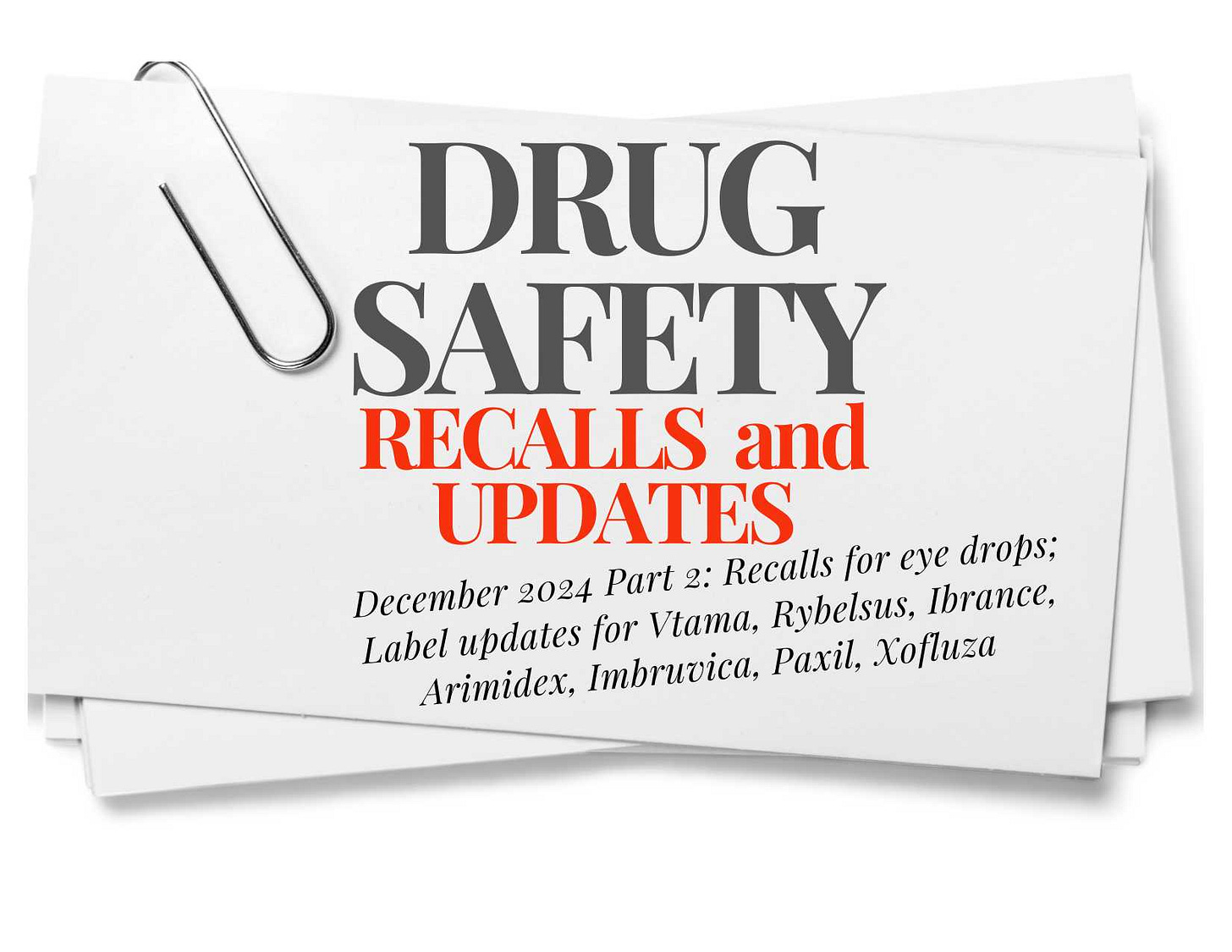December 2024 Part 2: Eye drops recall; Veozah boxed warning; new topical eczema treatment; Rybelsus; Zepbound for sleep apnea; Ibrance; Arimidex; Femara; Xofluza and young children; more
Eye Drops Recall: Systane Lubricant Eye Drops
The U.S. Food & Drug Administration (FDA) announced that Alcon Laboratories issued a recall for over-the-counter single-use eye drops. "Systane Lubricant Eye Drops Ultra PF, Single Vials On-the-Go, 25 count," with an expiration date of September 2025. In its explanation for the recall, Alcon said that a consumer reported seeing foreign material inside a sealed vial. Testing revealed that the material was fungal in nature and could pose a health risk. The product can be identified by the green and pink carton design, presence of “Systane” and “ULTRA PF” brand names on the front of the carton, and the “25 vials” package size. So far, Alcon Laboratories has not received any reports of adverse events related to this recall.
FDA Press release and additional product photos

New Boxed Warning for Menopause Hot Flashes Drug Veozah (fezolinetant)
Three months after issuing a "Drug Safety Communication" about the rare but serious risk of liver injuries (hepatoxicity) for patients taking the non-hormonal hot flashes treatment Veozah (fezolinetant), the FDA required that Veozah add a new boxed warning to its label. A "boxed warning" is the FDA’s most serious and prominent kind of warning highlighting known risks. The warning states that hepatic lab tests should be performed prior to treatment and at specified intervals during treatment. The warning also explains that drug-induced liver toxicity occurred within 40 days of starting Veozah. Veozah was approved in 2023.
FDA Press Release on Veozah Boxed Warning
Veozah FDA Safety Label Update
For more on this topic, check out:
Veozah and Liver Injuries from our September 2024 Drug Safety Update.
Vtama (tapinarof) cream
Vtama is a topical cream that until recently was only approved to treat plaque psoriasis in adults. Clinical trials safety information was added to the label supporting Vtama's recent new approval for treating atopic dermatitis (a type of eczema) in adults and pediatric patients age two and up. Some of the most common side effects experienced by people treated with Vtama for atopic dermatitis include upper and lower respiratory tract infections, vomiting, ear infection, headache, red bumps on skin (folliculitis), pain in extremities, asthma, and abdominal pain. Vtama was initially approved in 2022.
Vtama FDA Safety Label Change and Revised Drug Label
Vtama Patient Reviews on Ask a Patient website
Xofluza (baloxavir marboxil) and Drug-resistant Virus Mutations
Xofluza is a single-dose tablet or oral liquid that is taken to treat flu within 48 hours of symptom onset or is taken to prevent flu after exposure to someone who has influenza. Xofluza may cause a mutation of the virus that leads to drug resistance, especially among young children. Xofluza updated its label to correct specific clinical trials data related to a pediatric study. It adjusts the number of participants experiencing drug resistance from 43% to 40% among patients under the age of 5. Because of the increased resistance to baloxavir in pediatric patients, the drug is not approved for patients under the age of 5. The label states that the potential for transmission of resistant strains in the community has not been determined. Xofluza was initially approved in 2018.
Xofluza FDA Safety Update and Revised Drug Label
More on Xofluza and a study finding that the drug may cause flu virus mutations:
https://www.reuters.com/article/business/healthcare-pharmaceuticals/new-roche-flu-drug-can-drive-resistance-in-influenza-viruses-researchers-idUSKBN1XZ27I/
Xofluza Patient Review and links on Ask a Patient website
GLP-1 Drug Safety Updates and News
Rybelsus (semaglutide) once-daily pills
Rybelsus is a GLP-1 drug that treats type 2 diabetes. Its label was updated to report results from a required lactation study show that an ingredient in Rybelsus, salcaprozate sodium (SNAC) and/or its metabolites, are present in human milk. Breastfeeding while taking Rybelsus is not recommended. A section on severe gastrointestinal adverse reactions reported in people who use Rybelsus was also added. The side effects of alopecia (hair loss) and dysesthesia (abnormal or distorted sense of touch) were added to the Postmarketing Experience section of the drug label. Rybelsus was initially approved in 2019.
FDA Safety Announcement: Rybelsus FDA Safety Label Change and Revised Drug Label
Rybelsus Patient Reviews on Ask a Patient website
Zepbound (tirzepatide) weekly subcutaneous injection
Zepbound is a GLP-1 drug approved to treat weight loss in patients with obesity. Its label was updated to report safety data related to its recent approval for treating Obstructive Sleep Apnea (OSA) in patients with obesity. The adverse reactions observed with Zepbound administered subcutaneously once weekly were similar to those reported in the two pooled placebo controlled clinical trials for weight reduction. Similar rates of severe hypersensitivity reactions were observed in Zepbound clinical trials for weight reduction and in Zepbound trials for OSA. Zepbound was initially approved in 2022.
Zepbound FDA Safety Label Change and Revised Drug Label.
Zepbound Patient Reviews on Ask a Patient website
News: First Two Generics Approved in GLP-1 category
The FDA recently approved generic versions of two older GLP-1 drugs: twice-daily Byetta (exenatide) for type 2 diabetes in adults and once-daily Victoza (liraglutide) to treat type 2 diabetes in patients age 10 and up. Byetta was approved in 2005. Victoza was approved in 2010.
FDA News Release on Victoza generic
Label for Liraglutide (generic Victoza)
Label for Exenatide (generic Byetta)
Byetta patient reviews and Victoza patient reviews on Ask a Patient website
Overview of all GLP-1s (injectable and oral) with approval dates and more information:
https://www.askapatient.com/news/newly-approved-type-2-diabetes-drug-joins-GLP-1-class.asp
Cancer Drugs Safety Updates
Ibrance (palbociclib) tablets
Breast cancer drug Ibrance label now warns that blood clots (venous thromboembolism or VTE) have occurred after administration of the drug. Ibrance was initially approved in 2015.
Ibrance FDA Safety Update and Revised Drug Label
Ibrance patient reviews on Ask a Patient website
Arimidex (anastrozole) tablets; Aromasin (exemestane) tablets; Femara (letrozole) tablets
Arimedix, Aromasin, and Femara are "aromatase inhibitor" drugs that treat breast cancer in postmenopausal women by reducing the production of estrogen. Reduced estrogen helps to slow or reverse the growth of some breast cancers. Tendon-related disorders, including tendon rupture, tendonitis and tenosynovitis stenosans (trigger finger) were added to the Adverse Reactions, Postmarketing Experience section of the drug label. Arimidex was approved in 1995; Femara was approved in 1997; Aromasin received approval in 1999.
Arimidex FDA Safety Label Change
Aromasin FDA Safety Label Change
Femara FDA Safety Label Change
Many patients using these estrogen-blocking breast cancer drugs experience severe nerve-related symptoms. Learn more about patient experiences with neuropathy-type symptoms.
https://www.askapatient.com/news/breast-cancer-drugs-neuropathy-side-effects.asp
Imbruvica (ibrutinib) tablet, capsule, or liquid suspension
Leukemia and lymphoma drug Imbruvica added post-marketing reports of a skin disorder called "cutaneous vasculitis" (inflammation of blood vessels in the skin) to its label. Imbruvica was initially approved in 2013.
Imbruvica FDA Safety Label Change
Imbruvica patient reviews on Ask a Patient website
Paxil (paroxetine) tablets and oral suspension
Paxil treats major depression and anxiety disorder in adults. Its label was updated to add that published literature show adverse effects from paroxetine in human milk. Infants exposed to paroxetine through breast milk have experienced agitation, irritability, poor feeding and poor weight gain.
The patient medication guide was updated to add warnings about taking Paxil while pregnant. Taking it during your first trimester of pregnancy may cause your baby to be at an increased risk of having a heart problem. Taking it in the third trimester may cause breathing and lung problems, temperature, feeding problems, low muscle tone, and irritability.
Also, a new section under “Females and Males of Reproductive Potential" warns that clinical studies show that Paxil may affect sperm quality and may impair fertility in males; it is not known if the effect is reversible. Paxil was initially approved in 1992.
Paxil FDA Safety Label Change
Paxil patient reviews on Ask a Patient website
Meropenem, piperacillin-tazobactam intravenous injection
Meropenem (meropenem), Merrem (meropenem), Vabomere (meropenem and vaborbactim), and Zosyn (piperacillin and tazobactam), are antibiotics administered by intravenous infusion (I.V.) and treat a variety of serious infections. The drug labels contain new warnings about the risk of rhabdomyolysis. Rhabdomyolysis is the breakdown of muscle tissue that leads to the release of muscle fiber contents into the blood. Once in the blood, the substance, called myoglobin, may cause kidney damage. Symptoms of this condition include very dark urine, muscle pain, tenderness or muscle weakness. The FDA is requiring this safety update for meropenem and piperacillin-tazobactam products. Some other antibiotics have also been linked to rhabdomyolysis and have received similar safety updates.
Meropenem was initially approved in 1996. Zosyn (piperacillin and tazobactam) was approved in 1993.
Meropenem FDA Safety Label Change
Merren FDA Safety Label Change
Vabomere FDA Safety Label Change
Zosyn FDA Safety Label Change
Did you miss December 2024 Safety Label Update Part 1? Read it here:
Best wishes for a happy and healthy 2025 to all of our newsletter readers. Thank you for your support. Please visit our website at www.askapatient.com to read (or add your own) patient experiences with prescription drugs and some vaccines.



